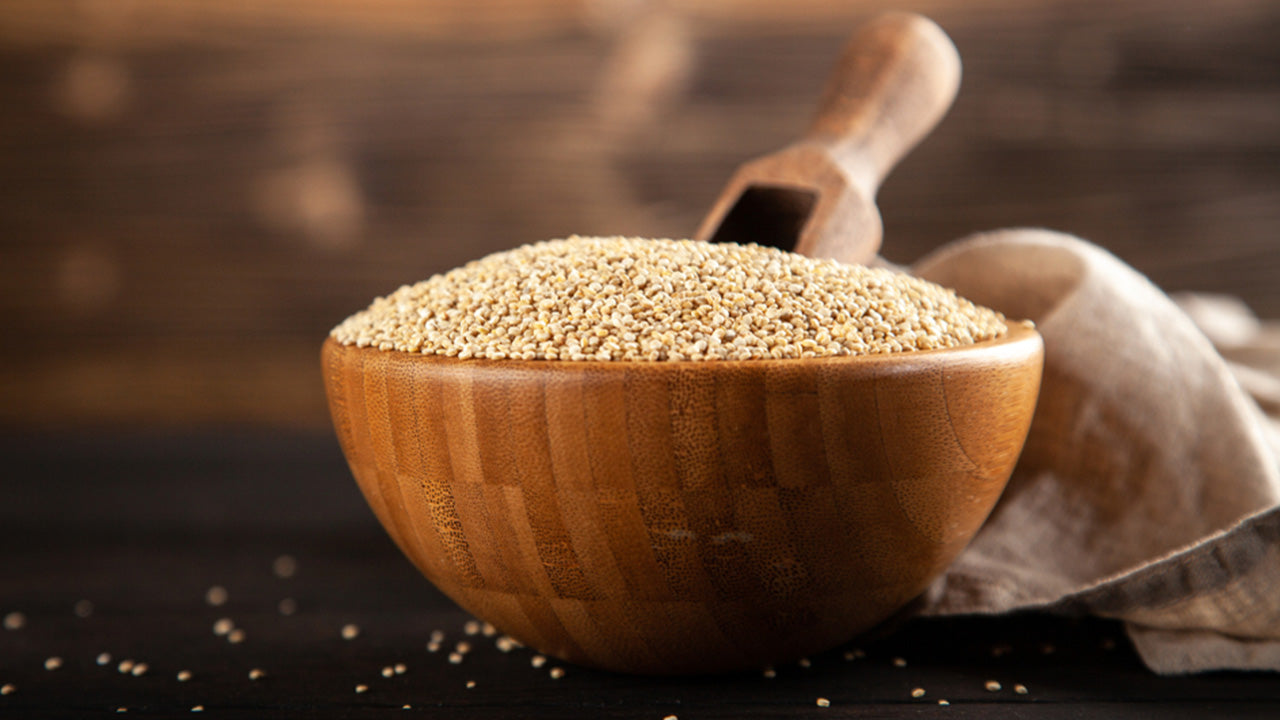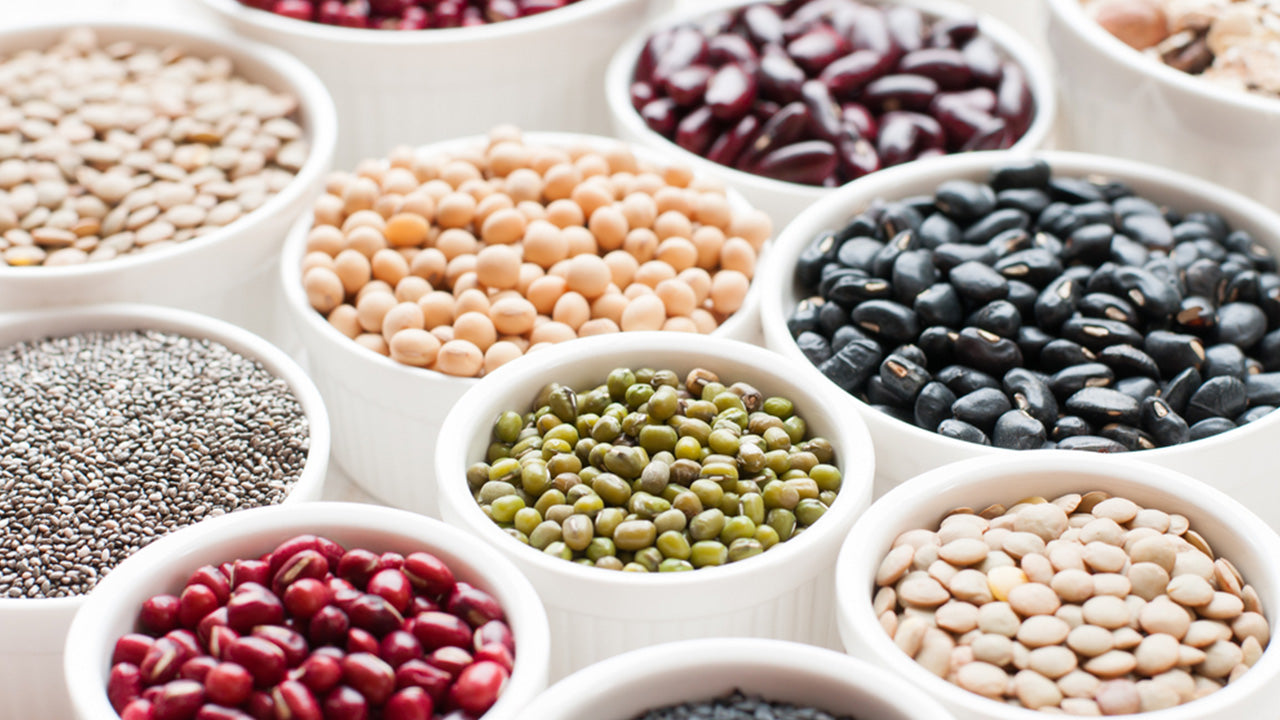Is Quinoa a Complete Protein? It May Just Be the Missing Link in Your Diet!
 By: by Amino Science
By: by Amino Science

Vegetarians, vegans, and even the meatless Monday crowd crave the same quality nutrition that the carnivore next door gets without breaking a sweat. Which leaves many of us wondering, is quinoa a complete protein? While it’s not difficult to get garden-variety nutrients in a plant-based diet, it can be a challenge to source the complete proteins found in animal products. Enter quinoa (KEEN-wah), a complete protein source that some hail as a supergrain.
We need 20 amino acids in different combinations to create the proteins that fuel our cells and power our lives. For instance, your heart is made of 95% amino acids. But our bodies alone can only create 11 of them. The other nine essential amino acids must come from what we eat, and quinoa is one of the plant sources that supplies each of these “building blocks of life.”
Is Quinoa a Complete Protein?
Quinoa is technically not a grain, but a seed. Regardless of classification, it's enjoyed much like other grain-based foods.
While most whole grains have some amino acids, they tend to lack the amino acid lysine or contain only trace amounts of it and don't deliver enough protein to sustain our essential amino acid requirements. The amino acid profile of quinoa, however, can be considered complete.
Quinoa offers up a good amount of lysine and the other eight essential amino acids to help support our bodies’ amino acid needs. And research shows that the digestion of quinoa protein is comparable to that of other high-quality protein foods.
Here's the possible catch: quinoa appears to be a high-quality protein, but that is in terms of quinoa protein isolate, which is actually of low quantity in quinoa seeds. The amino acid profile of quinoa is, for instance, significantly inferior to specially formulated essential amino acid mixtures. So, by all means, add quinoa to your diet to feed your body the essential amino acids it craves, but, if you are concerned that you aren't meeting your protein needs, then consider supplementing with essential amino acids according to your nutritional needs.

The protein in quinoa far surpasses the protein content of its grainy competitors. Take incomplete proteins such as rice and barley, for example. One cup of quinoa contains 8 grams of protein, while brown rice has only 5 grams, and barley less than that at 3.5 grams.

On par with rice and couscous, quinoa has a nutty taste with a slight toothsomeness. For a savory approach, some toss in bay leaves, thyme, garlic powder, and other herbs and spices, while the breakfast crowd might like it a bit sweeter, boiling it with milk, stirring in fruits and nuts with a dash of cinnamon or nutmeg. You can add quinoa to soups, salads, and stir-fries, or pop it like popcorn. Here are some recipes to try.
Harvest from an Ancient Table
A seed that comes to us courtesy of Peru, Bolivia, and Chile, quinoa means “the mother grain” in its original South American tongue, and dates back thousands of years. It was also called "The gold of the Incas" because, with a belly full, warriors as old as 50 had the fortitude to scale the Andes, fight amid the harsh terrain, and vanquish their enemies.
Though this superfood remained a secret tucked away in a distant land for millennia, word has gotten around. These days quinoa crops are sprouting up in North America, China, France, and India with production picking up in Africa and the Middle East. There are 1,800 types of quinoa in a rainbow of colors, but only a few made the leap to the U.S. The white variety is milder, while the red and black boast more nutrients. The harvested seeds of Chenopodium quinoa undergo processing to remove natural saponins, a bitter-tasting husk that acts as a natural pesticide to the maturing plant.
A Cornucopia of Nutritional Goodies
Apart from being one of the best sources of protein, quinoa has small amounts of omega-3 essential fatty acids, is non-GMO, and is usually organically grown, which makes it a good find. Astronaut Samantha Cristoforetti took a selfie with her pouch of quinoa aboard the International Space Station. She chose this plant protein as one of her “bonus foods,” pairing it with mackerel. Quinoa’s also held in lofty esteem by NASA scientists, who’ve explored growing it in outer space, as it reproduces and stores well, while offering nutritional bang for the buck. Aside from protein, which supports muscle, hair, collagen, enzymes, and antibodies, and fiber that helps our bodies absorb nutrients, quinoa is a strong source of:
- Manganese (58% of the RDA): A friend to the brain, nerves connective tissue, bones, blood, hormones, and metabolism.
- Magnesium (30% of the RDA): Gets the biochemical party started and helps with energy production.
- Phosphorous (28% of the RDA): Teams up with calcium to give strength and structure to bones and teeth.
- Folate (19% of the RDA): A B vitamin that hooks up with your DNA chain and percolates other genetic material.
- Copper (18% of the RDA): Links up with iron to help form red blood cells and keep blood vessels, nerves, immune system, and bones ticking like the Swiss.
- Iron (15% of the RDA): Important for healthy blood and transfer of oxygen from lungs and tissues.
- Zinc (13% of the RDA): Big on cell division, cell growth, wound healing, and the breakdown of carbohydrates. If you can smell and taste, thank zinc.
- Vitamins B1, B2, and B6 (more than 10% of the RDA): The Bs power energy level, brain function, and cell metabolism.
- Potassium (9% of the RDA): Regulates fluid balance, muscle contractions, and nerve signals. A diet rich in potassium may help reduce blood pressure and water retention, and help prevent stroke, osteoporosis, and kidney stones.

Fighting Disease Like an Incan Warrior
There’s a saying: Fruit doesn’t fall far from the tree. And while quinoa is mainly known for the ways it supports body function, it’s increasingly becoming appreciated—in the never-say-die spirit of its Incan ancestry—for its warrior-like attributes and health benefits.
Antioxidants? Check!
Quinoa ranks high in antioxidants, which help neutralize free radicals in the body. Free radicals are believed to contribute to aging and certain diseases. A study looked at antioxidant levels in five cereals, three pseudo-cereals, and two legumes, and found quinoa to have the highest antioxidant content of them all. When added to gluten-free goods, quinoa enhanced their polyphenol content, helping to stave off certain cancers, osteoporosis, and other unwanted health effects.
Quinoa May Boost Metabolism
A study published in the European Journal of Nutrition showed that using quinoa instead of typical gluten-free breads and pastas significantly reduced blood sugar, insulin, and triglyceride levels. And research with rats indicated that quinoa in a diet high in fructose almost completely inhibited the negative effects of the fructose.
Good for Low Glycemic Diets
The glycemic index measures how foods raise your blood-sugar levels. Foods that are high on the glycemic index can stimulate hunger and lead to overeating and obesity. Obesity can be a culprit in type 2 diabetes and heart disease. Quinoa has a glycemic index of 53, which is considered low and can be an ally in blood sugar control.
Feel Fuller, Eat Less
Quinoa has been associated with weight loss by boosting metabolism and reducing appetite, possibly because its high-fiber content may increase feelings of fullness, causing one to eat less, though more research is needed to help scientists better understand quinoa’s effects on metabolism.
A Hedge Against Diabetes
Studies of Peruvian grains and legumes found that quinoa, its cousin kañiwa, and other traditional crops from Peru’s Andes have the potential to manage type 2 diabetes and associated hypertension.
Putting the Kibosh on Cholesterol
High in soluble fiber, quinoa can help bring down blood sugar levels, lower cholesterol, and increase a sense of fullness, which can, potentially, help with weight loss.
Highly Regarded, but No Halo
Quinoa attributes are undisputed, but even with a glycemic index of 53, it is somewhat high in carbs, and not as well-suited to a low-carb diet.
Another potential hitch is quinoa’s naturally occurring phytic acid, which can make it harder for the body to absorb all of its rich minerals. Soaking and/or sprouting the seed prior to cooking can reduce that effect. Other than that, though, it’s pretty hot stuff. In fact, leaders are looking at mass-produced quinoa as a way to feed the world as the effects of climate change take hold. Given its high level of genetic diversity, quinoa crops are highly resilient to extremes in soil, rainfall, temperature, and altitude, and tolerant to frost, drought, and salinity, according to a 2016 report.
So, if you haven’t already, maybe it’s time to up your protein intake and add some quinoa to the menu. And if you need a little extra help in the protein department (you're vegan or vegetarian, a bodybuilder, or need nutritional support in times of illness or surgery), then consider taking a daily essential amino acid supplement!

Up to 25% off Amino
Shop NowTAGS: food
Join the Community
Comments (0)
Most Craveable Recipes




 833-264-6620
833-264-6620



















